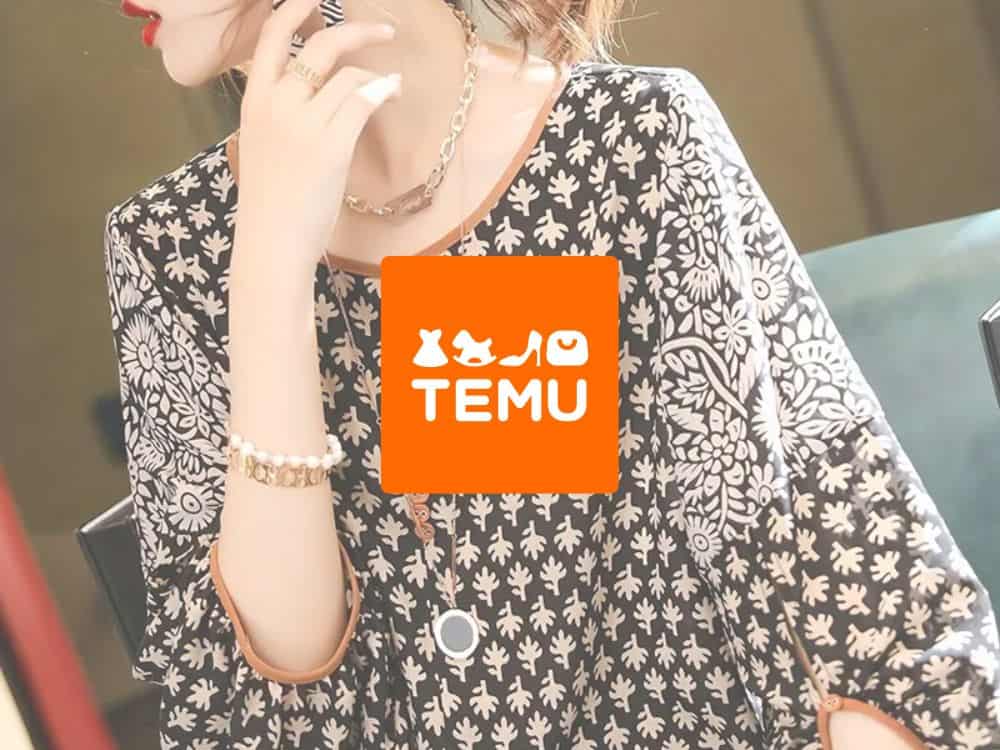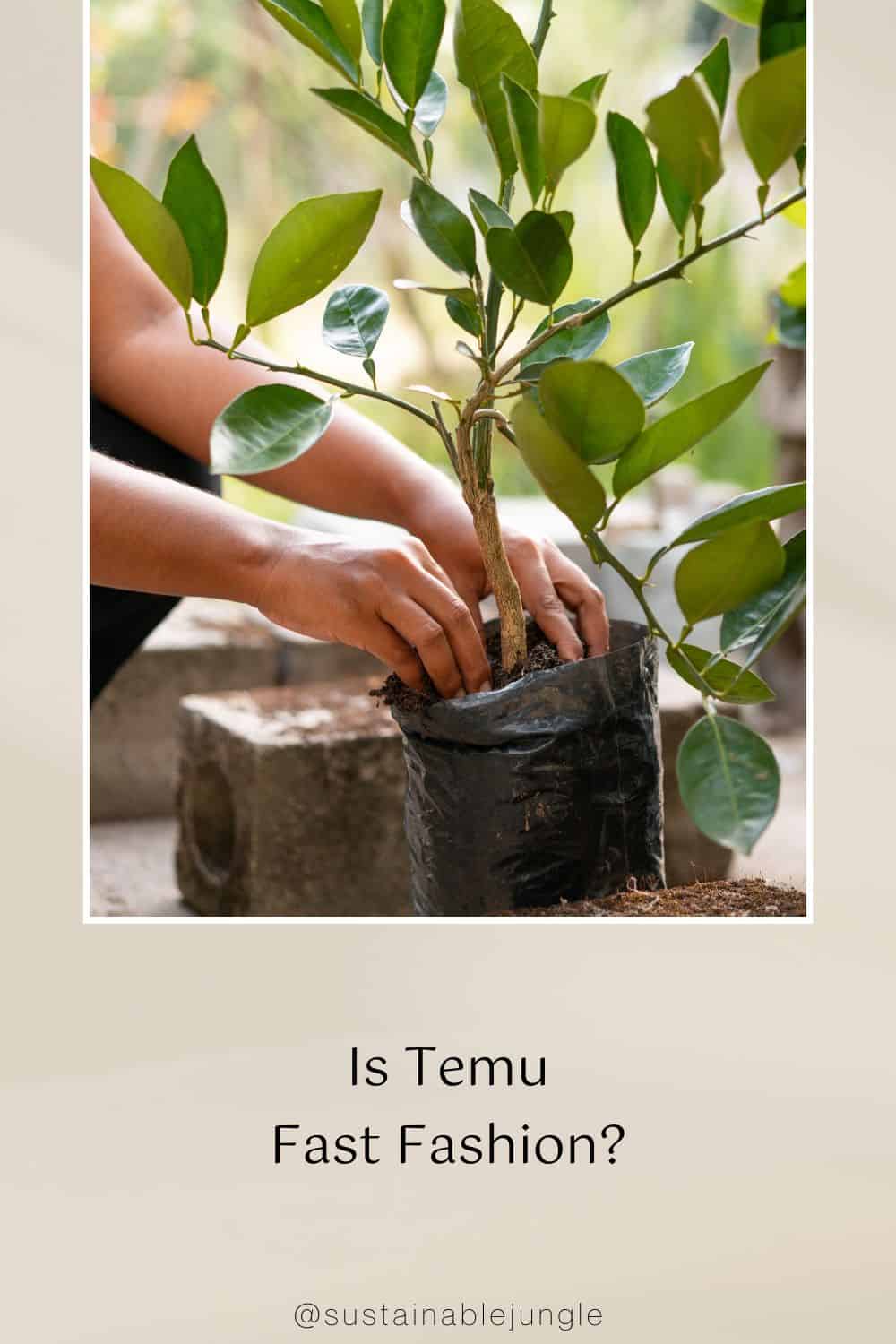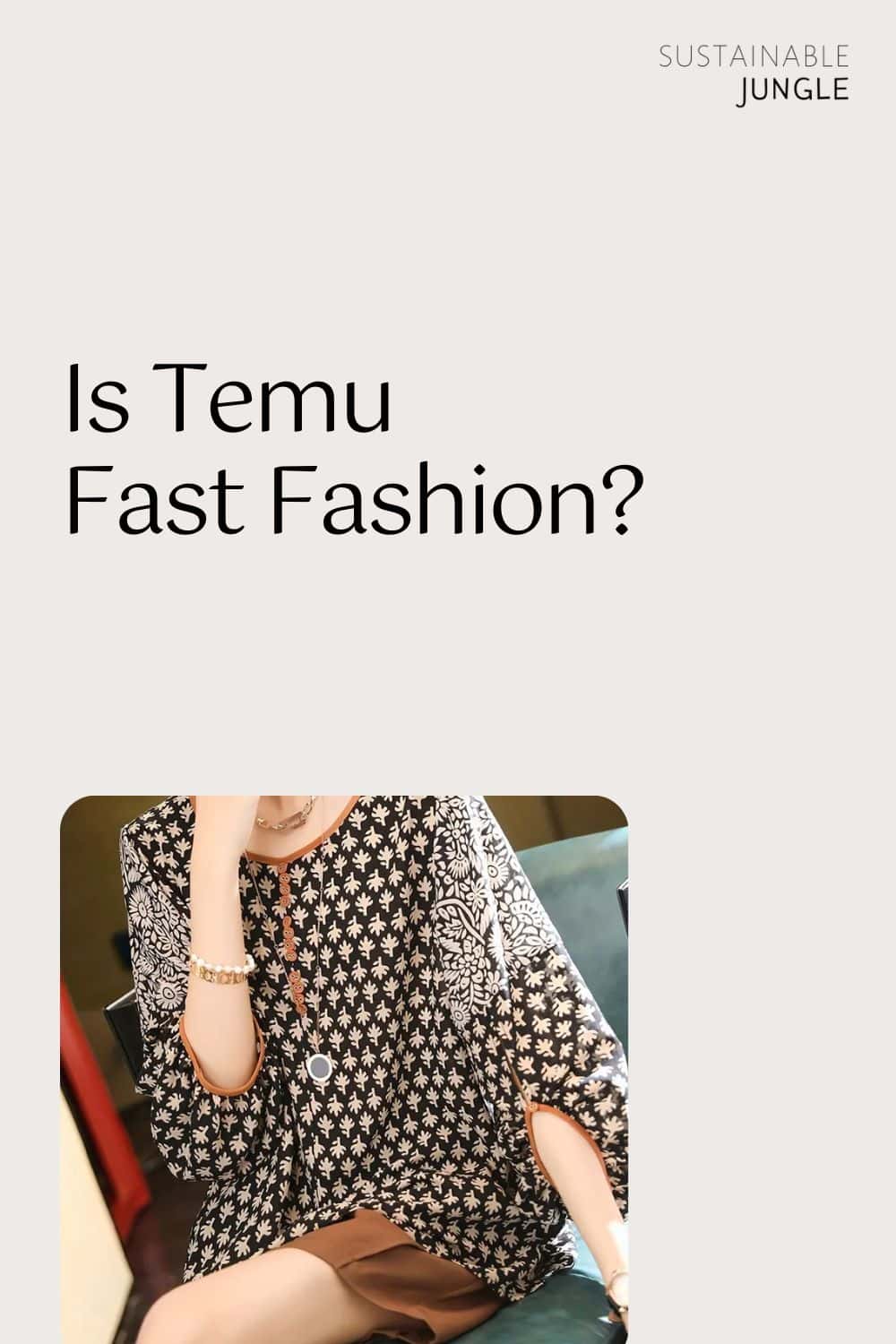
Is Temu Fast Fashion?
Mini washing machines, portable neck fans, and handheld vacuums…
Move over Shein, there’s a shiny new e-comm marketplace darling in town and they’ve come stocked with not only clothes, but books, toys, craft supplies, home decor, electronics, and much more.
With gamified shopping and low low prices, Temu has quickly become the biggest competitor for the ultra-fast fashion powerhouse.
Eerily similar prices and products make us wonder just how many similarities the two platforms share.
Which begs the question: is Temu fast fashion, too? And is Temu more ethical than Shein? Or even worse?
After diving deep into the platform, we can’t say we’re Team Temu in the slightest but we urge you to keep reading to come to your own conclusions.
1. Uncovering Why Temu Is Fast Fashion

Since 2022, China-based e-commerce emporium Temu has been luring in customers with tens of thousands of items available at shockingly low prices.
Which become even cheaper with potential loyalty rewards, subscription discounts, and spin-the-wheel deals.
With items priced as low as 20 cents, we can’t help but wonder: why is Temu so cheap?
Well, the Boston-based e-commerce company supposedly severely cuts costs by reducing middlemen and selling products directly from factory to consumer—meaning no agents, brokers, wholesalers, distributors, and retailers have to be paid.
Or marketers, thanks to Temu’s unique reverse marketing strategy. Rather than marketing their products to customers, Temu provides customer-favorite products that are already in demand.
Popular products are reordered, and less successful ones are replaced…
Which sounds like the textbook definition of fast fashion to us.
There’s no question about it: Temu is fast fashion. But, it’s pretty unique compared to other fast fashion brands we’ve covered.
Temu isn’t making profit on sales. It’s estimated that the platform actually loses between $588 to $954 million a year from cost-cutting practices.
Rather, Temu makes a profit via commissions on visitor traffic, which is charged to suppliers.
This is where quantity starts to overpass quality. With an estimated 104.2 million users, Temu is constantly looking for the next big thing to keep customers clicking.
Since Temu is a private company, there is no data available about Temu’s exact net worth.
But, considering the brand recently spent $21 million on 2024 Super Bowl advertisements that contained another $15 million in coupons and giveaways, we’d guess they’re doing pretty well.
Temu ethics and sustainability practices are also under wraps, making it hard for us to prove exactly why Temu is bad.
Lack of information usually speaks for itself though.
Let’s just say, the little information we could uncover put the “Is Temu a fast fashion company?” question to rest once and for.
2. Temu Controversy

Boston-based Temu is owned by PPD Holdings, a Chinese firm that also created the popular shopping app Pinduoduo.
Since Temu has been pretty hush hush about their operations, we looked into their parent and sister apps to uncover the truth behind such low prices.
Shein Vs Temu
With Temu’s growing popularity, Shein and Temu have been in an arms race for market dominance.
Which naturally means the rivals have been to court quite a few times.
It all started in December 2022, only five months after Temu launched. Shein sued the company for a number of other intellectual-property issues as well as “enlisting online influencers to make false and deceptive statements” about Shein products.
While Temu does have an influencer program that incentivizes content creators, the bold claim has never been proven and part of the lawsuit was dismissed.
Shein did win a temporary restraining order against Temu for copyright photos on product listings. They demanded all posts to be taken down (over 30,000) and £100,000 in damages.
Quite ironic, considering Shein has some pressing copyright claims themselves.
Most recently, Temu fired back by suing Shein for leveraging their market dominance to compel exclusive agreements with apparel manufacturers thus violating U.S. antitrust laws with “mafia-style” intimidation.
Exclusive dealing is common in business arrangements, though it is considered illegal when it substantially lessens competition and takes away freedom of association.
This case is still ongoing.
Sneaky Small Package Shipments
Under the U.S. de minimis provisions, items imported to the United States are not subject to tariffs or inspections so long as they are under $800 in value.
It has been alleged that Temu is abusing these tariff laws through trade loopholes, in a report that estimates nearly 600,000 of these small packages are sent to the U.S. every day—which is quite possibly why Temu offers free overseas shipping on any order of just $10 or more.
We’re not sure the last time you checked shipping costs, but it’s hard to ship domestically for that small amount, let alone internationally.
Just the simple thought of all that carbon and packaging waste makes us sad.
And that’s without considering all the dangerous or hazardous ingredients that sneak past borders thanks to less thorough inspections.
Art Theft
Besides saving money on just middlemen and marketers, Temu also seems to be saving money on designers.
By art theft, that is.
A number of small artists have shared stories about their designs being ripped off and sold at prices they simply cannot compete with.
Like this Raleigh based Etsy-artist, who’s original $7 sticker designs were being sold on Temu for less than $2. She explained:
“I sold about 800 of these stickers the past year and Temu, however long it was up, sold about 2,000. If any of that traffic would have gone my way … I think it definitely hurts me, financially.”
Temu apologized to the artist, but nothing was done for compensation.
An unfortunate reality for many of the other small artists that Temu has ripped off.
That’s not even accounting for the untold number of intellectual property rights infringements on larger franchises and brands.
Temu offers thousands of pop-culture based products—everything from k-pop and anime to Game of Thrones and the best-selling ACOTAR books series—that cleverly don’t mention the franchise anywhere in the title or product description to avoid discovery by the entities that legally own these images and ideas.
Questionable Safety
Is Temu legit and safe?
Though Temu is a legitimate online retailer, there have been a number of concerns raised about the actual quality of their products and services.
The e-commerce entity has been subject to over 100 complaints to the Better Business Bureau, ranging from damaged goods to deliveries not showing up.
Many customers claim product descriptions don’t match what arrives. The picture color is different, the quality is not as expected, or the sizes are off.
Personal Data Risks
In May 2023, the USCC raised concerns about personal data risks associated with the Temu platform.
Claims that came after Pinuduoduo was suspended from Google Play because some of its versions were found to contain malware.
Temu is now dealing with class action lawsuits in Illinois and New York for allegedly gathering customer data using permissions to access Bluetooth and Wi-Fi network information.
Even aside from this Temu app controversy, shoppers aren’t necessarily safe by sticking to the website, due to mass data collection on Temu users, which, as a Chinese company, means the Chinese government also has unfettered access to.
The Better Business Bureau (BBB)—which ranks Temu as C+ currently and does not accredit them overall—has also launched investigations after hundreds of user complaints of not just poor customer service, but identify theft.
3. Temu Ethics Are Not Looking Good

How ethical is Temu?
Considering the brand is as transparent as a brick wall, we don’t have high hopes, though perhaps parent company PPD Holdings can shed some light on the situation.
In 2021, PPD Holdings’ platform Pinduaduo was accused of forcing employees to do intensive overtime, which ultimately led to the death of some of their employees.
Which obviously leaves us wondering: is it ethical to buy from Temu?
It is said that the platform abides by a 996 working hour system that requires workers to work from 9 A.M. to 9 P.M., 6 days a week (or 72 hours per week).
Given the incredibly low prices of Temu products, if these allegations are true, workers are being paid an excruciatingly low salary on top of these exploitative quotas and conditions.
In June 2023, U.S. lawmakers also warned consumers that there was a high possibility goods offered on Temu were produced from forced labor.
The U.S. House Select Committee on the Chinese Communist Party accused Temu of avoiding sanctions under the U.S.’s Uyghur Forced Labor Prevention Act (UFLPA), which restricts goods linked to human right abuses in Xinjiang.
The particular region of Northwest China is known for forced labor as well as allegations of torture and and allegations of sexual and gender-based violence.
“Temu is doing next to nothing to keep its supply chain free from slave labor,” said Republican senator Mike Gallagher, referring to the allegations.
The allegations of unfair labor are so intense that U.S. lawmakers are actively seeking a Temu import ban over the claims.
Animal Welfare
Information on Temu’s Animal Welfare product remains absent, as individual suppliers and manufacturers usually make the rules.
As of January 2023, China no longer requires animal-testing on their products, but this doesn’t mean it isn’t a common practice.
The platform supposedly has plenty of “cruelty-free” options to choose from—though we wouldn’t be quick to trust any of them.
In terms of animal-derived products, we were surprised that most (perhaps all) of Temu’s fur products are actually made from faux fur—though given their astronomically low prices, we’re left to assume this choice boils down to economics, not ethics.
4. Temu Sustainability Is Nearly Non-Existent

Is Temu sustainable?
If you look up the term in their search bar, you’ll find a ton of seemingly sustainable items.
Like 5-pack of coconut fiber sponges ($1.76), 6-piece reusable beeswax wraps ($10.99), 20-piece bamboo toothbrushes ($12.98), and biodiversity increasing wooden insect hotels ($7.43).
There’s even some clothing made from sustainable fabrics like organic cotton and bamboo.
If that’s the case, why is Temu bad for the environment?
Partially because these sustainable items make up less than 1% of their total product offerings. You’re much more likely to stumble upon plastic knick-knacks, microplastic shedding synthetic fabrics, and cheaply-made electronics.
All which, we’ll remind you, will be delivered right to your doorstep after a long, padded, carbon-filled journey across the globe.
Not to mention the fact that EVERY SINGLE ITEM comes individually wrapped in plastic (sometimes multiple times), meaning copious amounts of packaging waste in every order.
On a small positive note, Temu claims to have planted over 5 million trees in high need regions of sub-Saharan Africa via partnership with Trees for The Future.
And they actually have proof of it based on an official certificate of support from the non-profit.
However, it’s worth noting that they ask all customers to donate $0.25 at checkout toward these tree planting efforts, so Temu doesn’t appear to be willing to part with any of its own profits to plant trees.
But other than tree planting, there is ZERO mention of any carbon cutting or offsetting initiatives to reduce the Temu environmental impact, resource saving manufacturing practices, or even restriction of hazardous materials in their supply chain.
Did you know we Have a Newsletter?
We cover the latest in sustainable living, fashion, zero waste, beauty, travel, finance and more…
Final Thoughts On Is Temu Ethical?
So, is Temu bad to buy from?
Though we’d never shame anyone for buying within their budget, we urge shoppers to consider the true price of these massively-discounted items.
If you’re not paying, chances are someone else is.
Which is why we urge anyone who can to stay far away from low-price, high-impact brands like Zara, Cider, YesStyle, Shein, and Temu.
There are plenty of more affordable alternatives out there for those looking to refresh their homes and wardrobes on a budget, namely these second hand stores.
After the Super Bowl, Temu has been brought into the limelight—for better or worse—so next time you hear someone asking, “Why is Temu bad?”, slide this article their way.
Pin these:





